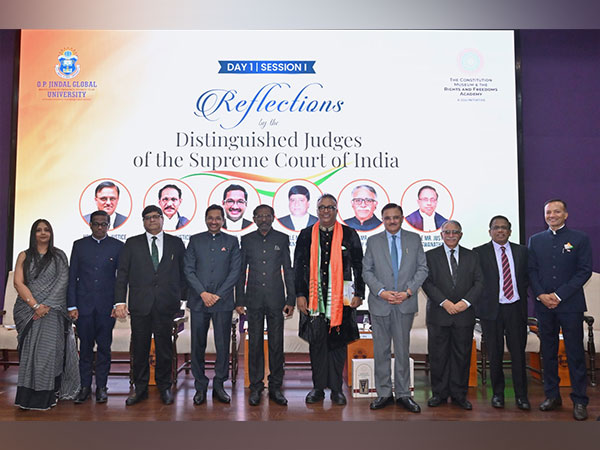Basic Structure of the Constitution is Inviolable: Six Supreme Court Judges at the National Convention on the Constitution
Nov 28, 2024
OP Jindal University
Sonipat (Haryana) [India], November 28: The Basic Structure of the Constitution is inviolable and that the judiciary has proved to be an effective check to prevent any excess and ensured the protection of the values as envisaged by the framers of the Constitution. This was the consensus by six judges of the Supreme Court of India who were speaking at the National Convention on the Constitution of India and inauguration of India's First Constitution Museum. This was organised on the occasion of the 75th anniversary of the Adoption of the Indian Constitution at O.P. Jindal Global University.
Prof. (Dr.) C. Raj Kumar, Founding Vice Chancellor and Dean, Jindal Global Law School at O.P. Jindal Global University said in his introduction, "It is a monumental occasion to have six Supreme Court judges to join at the National Convention on the Constitution of India and reflect on the impact of this important document. The Constitution is not just a legal framework but a living document and is a moral compass to protect the rights and freedoms of citizens. It is indeed a unique privilege to welcome Justice Abhay S. Oka, Justice C.T. Ravikumar, Justice M.M. Sundresh, Justice Sudhanshu Dhulia, Justice Sanjay Karol and Justice K.V. Viswanathan - Judges of the Supreme Court of India."
Dr. Raj Kumar also took the eminent judges to view the India's First Museum devoted to the India's Constitution & the Rights and Freedoms Academy which showcases our historical journey since the Adoption of the Constitution on Nov 26, 1949.
Justice C.T. Ravikumar said, "The Constitution is not just a mechanical directive. It has a soul and mission of its own. It was 75 years ago that we embarked on the biggest experiment in human history in the establishment of the world's largest democracy by our founding fathers led by Dr. B.R. Ambedkar. The Constitution is also a social document which promises justice to all. As part of the judiciary, it has been my privilege to see the Constitution continue to evolve while remaining true to its core. The Constitution's greatest strength lies not in its permanence but in its adaptability to respond to the changing times while protecting the fundamental rights and the rules of law. The founding fathers of our constitution had immense faith and trust in the Indian judiciary.
Justice Abhay S. Oka said, "I congratulate O.P. Jindal Global University on this unique initiative. The Constitution promises social, economic and political justice to all. We need to make an honest assessment if the judiciary has fulfilled the expectations of the common man about what we have done during the last 75 years, whether the benefits of fundamental rights have reached the common man of this country and sadly the answer will have to be no and therefore this is one thing which all of us will have to seriously consider. Today we must pledge to protect our constitution and its basic structure; only then will we be able to protect the fundamental rights of our citizens."
Justice M.M. Sundresh said, "The Constitution led to the founding spirit of India as a democratic republic founded on the core values of justice for all. The basic structure of the Constitution must continue with adequate changes to ensure that we do not have a narrow, pedantic view. Every act and every rule must conform to the Constitution and the state and central legislature cannot go beyond the Constitution. A policy decision must conform to the mandate of the Constitution. Along with fundamental rights, there are also fundamental duties and basic principles to be adhered to.
Justice Sudhanshu Dhulia said, "As we are aware, India is a very diverse country. At the time of independence many scholars and statesmen had written off India saying that the country will not survive and it will be balkanised as it's not a country but a continent. We have proved them wrong as we have not only survived as a nation but we have survived as a democracy where every five years we have elections and we elect our representatives. There are a lot of achievements and the Constitution is the reason why India remains a united country."
Justice Sanjay Karol said, "I would like to reflect on the functioning of the Indian Judiciary in the context of the Indian Constitution. As a judge I abide by the preamble of the Constitution and to uphold and respect its ideals. It should be our duty to demonstrate excellence in all spheres of individual and collective activity so that the nation constantly rises to higher levels of endeavour and achievement. In this context, the independence of the Indian Judiciary is absolutely paramount for the functioning of the Constitution.
Justice K.V. Viswanathan said, "It is important to review the balance sheet about the performance of our institutions under the Constitution of India and we have done extraordinarily well in this regard. You will not find a single instance in the last 75 years of any legislature or parliament clinging to office after their term was over. This shows the smooth functioning of the Constitution and the greatness of our citizens. It is to be noted that during the course of our journey it is the duty of every citizen of India to promote harmony and the spirit of common brotherhood transcending religious, linguistic and regional sectional diversities. The Constitution's basic structure is a very important document as the judiciary has played a salutary role and been a firm check to prevent any excess!"
Earlier, welcoming the distinguished gathering, Prof (Dr.) S.G. Sreejith, Executive Dean, Jindal Global Law School said, "We are living in a glorious moment which marks the 75th anniversary of the Indian Constitution. History often gives itself generously to people. This moment is a recurrence of the founding moment of India."
Prof. (Dr.) Dipika Jain Vice Dean Jindal Global Law School also contributed to the discussion and said, "The Constitution is the bedrock of democracy and governance and has had profound impact that the Constitution has had on shaping our nation. It is a powerful framework crafted in the aftermath of independence and provided a vision for a diverse nation to unite on the principle of justice, equality and freedom."
(ADVERTORIAL DISCLAIMER: The above press release has been provided by OP Jindal University. ANI will not be responsible in any way for the content of the same)








